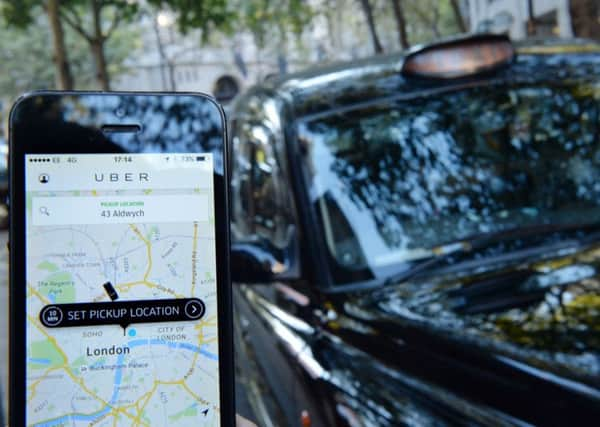Aisha Iqbal: Not Uber enthused by firm's top billing


On the whole, it was really inspiring to see positive discussions about the potential Leeds and its neighbours have, and the economic and other benefits of working collaboratively and singing from the same hymn sheet when it comes to lobbying Government for funding.
But one element of the day’s proceedings left me with a distinctly bitter aftertaste.
Advertisement
Hide AdAdvertisement
Hide AdAmong the keynote speeches, equal top billing was given to ride-hailing app Uber, a word which has – in the last few years – become ubiquitous, a by-word for ‘taxi’ for the post-digital generation.
Ostensibly an opportunity for the firm to present its ideas for integrating public transport in the region, this was essentially an extended advert, and I have to doff my cap to the company for bagging such a lucrative spot.
But while the genius of the company’s concept and marketing – and the sheer magnitude and speed of its success – has to be admired, its well documented working practices do not.
On the same day as the conference by the way, and just a couple of miles away on the outskirts of Leeds city centre, scores of Uber’s own drivers were staging a protest.
Advertisement
Hide AdAdvertisement
Hide AdNo mention of that in the glittering marketing blurb and Powerpoints, of course.
But while clashes with its own workers seem to have become the norm, the firm has also found itself at loggerheads with politicians across the parties.
Just a few months ago, Prime Minister Theresa May said in a speech that the company’s behaviour was an example of why strengthening legislation to protect workers in the so-called ‘gig’ economy is so important.
For ‘gig economy’, read zero hours contracts, something civic leaders in Leeds have been complaining about – and making pledges about clamping down on – for a long time.
Advertisement
Hide AdAdvertisement
Hide AdLast year, Uber lost its appeal against a court ruling that its drivers should be classed as workers with minimum-wage rights. The case could still end up in the supreme court.
And London Mayor Sadiq Khan has had a long-running public spat with the firm, which recently won a 15-month licence to continue operating in London, after its request for a five-year licence was refused.
Mr Khan is still seeking powers to limit the number of Uber drivers operating in the capital.
And it’s not just in the UK this issue has caused waves.
New York City has recently enforced new laws which effectively cap the number of Uber drivers in the city, and also set a minimum wage for all app-based drivers.
Advertisement
Hide AdAdvertisement
Hide AdSo, bearing all this in mind, I was a little bemused by key decision-makers and power-brokers in our region sharing such a high-profile platform with the firm.
If the Northern Powerhouse is going to be about improved opportunities to bring new connectivity, skills and jobs to cities like Leeds, then it also has to champion and be a beacon for good working practices. And to do that, it must align itself with people who do the same – or at least use its influence to force change.
The North is, and was, the former industrial and mining heartland of the country.
We live and breathe passion and grit and, above all, fairness.
So if the Northern Powerhouse is going to truly champion the North, it needs to do it with a conscience and a moral backbone worthy of its name and the people it represents.